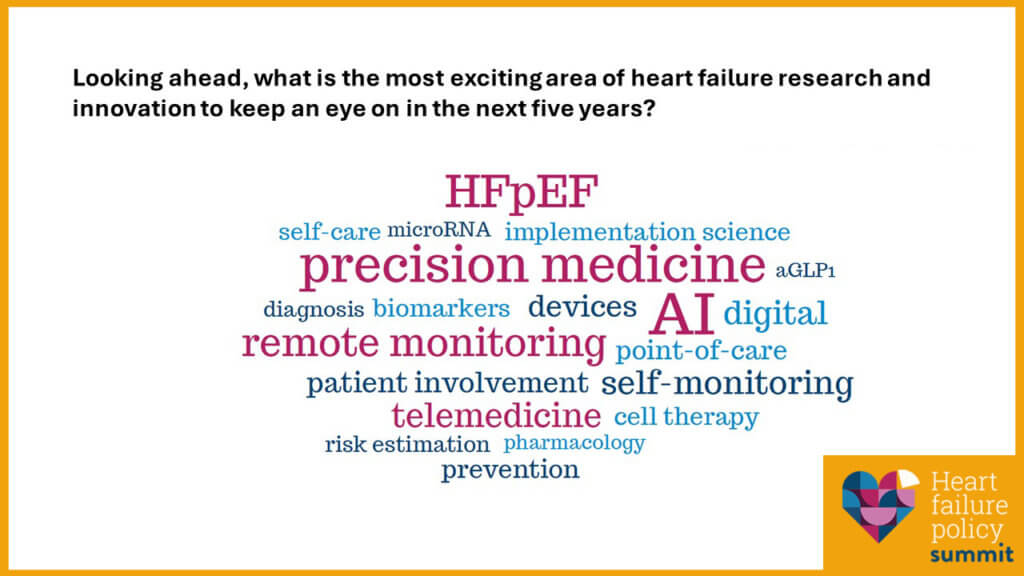
With over 64 million people across the world living with heart failure (a number expected to continue increasing due to population ageing), addressing this condition is more vital than ever. Recent decades have seen remarkable advancements that hold potential to reshape the landscape of heart failure care. Despite this, such innovations in clinical practice, technology and research remain underutilised due to a chronic lack of funding and policy focus. This year’s Summit aimed to catalyse the political commitment needed to harness the benefits of these advancements, ensuring equitable access to best-practice care.
A pre-event survey indicated attendees were keen to learn about areas of innovation in heart failure such as AI, telemedicine, biomarker testing, multidisciplinary care coordination and early detection. Respondents also saw the Summit as an important opportunity to learn from the experience of others; this became a central focus of the event through spotlight sessions on real-world initiatives.
The 2024 Summit aimed to share a hopeful outlook on the opportunities that exist to improve heart failure outcomes. So, what did we learn?
The participation of notable policymakers at this year’s Summit demonstrated the increasing prioritisation of heart failure by governments. In the opening address, Spanish Minister for Health Mónica García Gómez called on national governments to follow the lead of the Spanish Cardiovascular Health Plan and adopt a strategic approach to address the growing burden of heart failure. This was the first time a national minister of health has spoken at a Health Failure Policy Summit – a promising indication of increasing political focus on the issue.
It was encouraging to hear how such efforts are already coming into play in Romania, with specific heart failure objectives included in the plan to support the implementation of the Romanian National Health Strategy 2023–2030.
Such calls were also reiterated at a European level, with Demetris Papadakis, Member of the European Parliament, emphasising the need for dedicated funding and policies to address the challenges posed by the growing burden of heart failure. Discussion during the Summit indicated the importance of developing a European Cardiovascular Health Plan to secure progress in this area.
In their keynote address, Professor Giuseppe Rosano and Professor John Teerlink outlined promising new horizons in heart failure care. However, they stressed the need to ensure that innovations are effectively and equitably integrated into clinical practice to achieve early detection and personalised management of the condition.
Throughout the Summit, attendees heard about notable examples of how such innovations are already being successfully used to address workforce shortages and improve heart failure outcomes. Speakers explored how AI-assisted echocardiography is being brought to communities, such as through the UK’s first community-based breathlessness screening hub, which was set up in partnership with the official charity of Everton Football Club. We also heard about how a concert venue was used to test the potential of integrating this technology into heart failure care pathways – namely, the OPERA-HF model. These novel approaches are already helping to secure earlier detection and improve care while simultaneously enhancing health system efficiency.
International collaboration was shown to be a powerful tool, as demonstrated through the Lithuanian Heart Failure Association’s successful efforts to secure the reimbursement of natriuretic peptide testing across the nation. It was encouraging to hear from Aistė Štaraitė about how this achievement was facilitated through collaboration among the heart failure community, with the global expansion of the Heart Failure Patient Charter, originally produced by HeartLife Foundation, central to the success in Lithuania. Marc Bains, HeartLife Foundation’s CEO, joined us to discuss the origins of the Charter and their new Heart Failure Policy Framework. Launched in late 2023, the Framework makes a compelling economic case for the integration of innovations to improve heart failure care.
The 2024 Heart Failure Policy Summit showcased a wealth of expertise and pioneering solutions for improving heart failure outcomes, and reinforced what can be achieved through advocacy and enhanced political action.
Recordings of the Summit are available to view here.